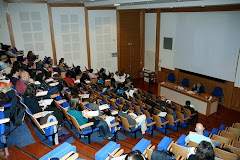Translation/transmissibility
and transcultural communication in the humanities
The Ecole des Hautes Etudes en Sciences Sociales (Paris), 10th-11th May 2010
“The limits of my language are the limits of my world”—Wittgenstein
“The sum of human wisdom is not contained in any one language, and no single language is
CAPABLE of expressing all forms and degrees of human comprehension.”—Ezra Pound
and transcultural communication in the humanities
The Ecole des Hautes Etudes en Sciences Sociales (Paris), 10th-11th May 2010
“The limits of my language are the limits of my world”—Wittgenstein
“The sum of human wisdom is not contained in any one language, and no single language is
CAPABLE of expressing all forms and degrees of human comprehension.”—Ezra Pound
This two day conference aims to address the problematic of translation as it is applied specifically to the study, teaching, research and dissemination of intellectual information within the various disciplines of the Humanities. In fact, it is time to re-examine political, cultural and social constructions in the context of, and as they are related to, translation and translation theory within the Social Sciences.
To help prompt various reflections, presenters may wish to address questions such as what is the cultural, or even rational identity one might call author, or the value of an “original text” or “original thought” once they have gone through the process of translation? How are social systems facing or failing to acknowledge each other through the cross-cultural work of translation in the Humanities? What hold does the translator have over how disciplines in the Humanities and its theories, (in particular philosophy, sociology or anthropology), are received abroad, out of the local contexts, native language, and cultural background that make up the thinking behind the original writing? How might one reconsider within the framework of translation arguments from such texts as Michel Foucault’s “The Author Function”? or, if limited to Humanities translation, Walter Benjamin’s “The Author as Producer” and “The Task of the Translator” ? How is academic translation related to Deleuze and Guattari’s concept of "the deterritorialization of language"? What intellectual errors or omissions have occurred through mistranslation (deliberate or accidental), and how has this lead to surprisingly fruitful or disastrous consequences in research? If we accept that translation implies a cultural conversion of the text, how can it be treated with equal weight in its non-native form? As such, how might the practice of translation dislodge binary constructs of cultural and national identities which assume essence, fixity, and hierarchy?
Within the context of such interrogation, papers may examine literary, theoretical, philosophical or other works that have had greater reception in translation than in their native language. They may also address the social ramifications of language domination as it pertains to erasure or accentuation of various languages via translation. Other topics we would encourage include:
—translation and tangential thought processes
—close examination of retranslations of a single theoretical text throughout time
—the variants retranslations reveal about cultural context and change as opposed to the linguistic value of a text
—intertextuality in translation
—translation’s relationship with postcolonialism and postcolonial studies
—translation as interpretation and misinterpretation of The Other in a social science context.
We encourage interdisciplinary papers, those which think beyond the traditional limits of translation to explore issues and consequence of cultural transfer or isolation. Please send a title with a 300 word abstract and a brief bio in English, French, or German to Jennifer K Dick & Stephanie Schwerter at transmissibility@gmail.com before the 1st of February 2010. We encourage papers from professors, researchers and scholars at all levels of their career, including MA and PhD candidates.
—translation and tangential thought processes
—close examination of retranslations of a single theoretical text throughout time
—the variants retranslations reveal about cultural context and change as opposed to the linguistic value of a text
—intertextuality in translation
—translation’s relationship with postcolonialism and postcolonial studies
—translation as interpretation and misinterpretation of The Other in a social science context.
We encourage interdisciplinary papers, those which think beyond the traditional limits of translation to explore issues and consequence of cultural transfer or isolation. Please send a title with a 300 word abstract and a brief bio in English, French, or German to Jennifer K Dick & Stephanie Schwerter at transmissibility@gmail.com before the 1st of February 2010. We encourage papers from professors, researchers and scholars at all levels of their career, including MA and PhD candidates.



Aucun commentaire:
Enregistrer un commentaire